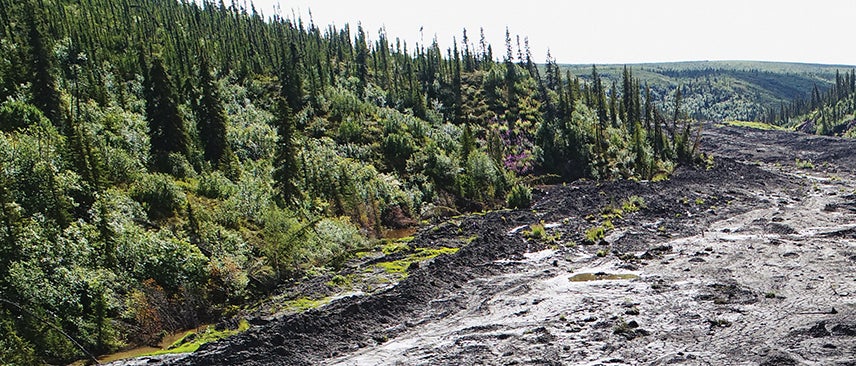Canada’s Minister of Environment and Climate Change, the Honourable Catherine McKenna, has announced recipients of the highly competitive “Advancing Climate Change Science in Canada” initiative. Of the nine recipients announced today, two projects led by Waterloo researchers were selected for funding over three years.
Water Institute member Fereidoun Rezanezhad, Assistant Professor in Waterloo’s Department of Earth and Environmental Sciences, was awarded $468,500 for the project “Winter Carbon Losses in Wetland Ecosystems under Current and Future Climates”.
Water Institute member Sherry Schiff, Professor in Waterloo’s Department of Earth and Environmental Sciences, was awarded $536,595 for the project “Changing Carbon Sinks in Subarctic Canada”.
The Advancing Climate Change Science in Canada initiative is a joint collaboration among NSERC, Environment and Climate Change Canada (ECCC) and Health Canada that will increase the scientific information available to support government decision-making on climate action. The total funding for the program is $4.7 million, with contributions of $2 million from NSERC; $1.9 million from ECCC; and $800,000 from Health Canada.
Winter Carbon Losses in Wetland Ecosystems under Current and Future Climates:
High latitude cold regions, including Arctic and northern areas of Canada, are warming more than twice as fast as the rest of the planet, with the greatest warming occurring during the winter. Canada’s temperate to subarctic wetlands and permafrost peatlands hold large stores of carbon which are susceptible to loss under future climate warming scenarios. Therefore, understanding the factors which regulate the processes controlling greenhouse gas emissions during the non-growing season is critical for predicting the fate of these vulnerable carbon stocks and for creating climate adaptation and mitigation strategies.
With a focus on these critical ecosystems, the project bring together Canadian leaders from multiple disciplines from across universities with federal government scientists and policy makers to determine the drivers of non-growing season carbon cycling, develop process-based environmental models, and estimate CO2 emissions. In doing so, the project will address the knowledge gaps on emissions to provide data and tools to evaluate the impact of winter warming mitigation in controlling carbon losses from pan-Canadian wetland ecosystems.
The co-investigators on this award are Philippe Van Cappellen (Department of Earth and Environmental Sciences; Water Institute member), Jonathan Price (Department of Geography and Environmental Management; Water Institute member), William Quinton (Wilfrid Laurier University), Nathan Bisiliko (Laurentian University) and Pascale Roy-Leveillee (Laurentian University). Collaborators are Christina Smeaton (Grenfell Campus, Memorial University of Newfoundland) and Nancy Goucher (Water Institute). The Canadian Forest Service Great Lakes Forestry Centre, Natural Resources Canada is a supporting organization through Kara Webster.

Photo: Courtesy of Government of Northwest Territories and Canada Centre for Mapping and Earth Observation
Changing Carbon Sinks in Subarctic Canada:
Lakes and ponds in the Precambrian Shield geology of northern Canada store large amounts of carbon in their sediments. These carbon sinks are vast but extremely vulnerable to human and climatic perturbation. This part of the subarctic and low Arctic covers a large portion of Canada and is warming at an accelerated rate resulting in rapidly degrading permafrost and increased drought frequency, both of which affect carbon pathways.
The objective of Professor Schiff’s project is to improve the quantitative understanding of carbon dynamics in Canadian subarctic freshwaters, with a focus on protecting natural carbon sinks and processes that govern the balance between carbon sinks and carbon sources to the atmosphere. The project will involve remote sensing and ground-based data collection and will couple hydrology, landscape unit analysis, biogeochemistry and modelling and incorporate new techniques using stable isotopes in addition to natural 14C. The project will contribute to science-based decision making and effective delivery of climate change actions related to the consequences of human activities that affect the partitioning of carbon between carbon sequestration in sediments and release of greenhouse gases to the atmosphere.
The co-investigators on this award are Michael English (Wilfrid Laurier University), Jason Venkiteswaran (Wilfrid Laurier University), Nora Casson (University of Winnipeg) and Raoul-Marie Couture (Laval University). Collaborators are Erik Emilson (Canadian Forest Service, Natural Resources Canada), John Spoelstra (Environment and Climate Change Canada (ECCC)), D. Peters (ECCC), C.D. Spence (ECCC) and David Butman (University of Washington).
A complete list of the Advancing Climate Change Science in Canada recipients is posted on NSERC’s site.